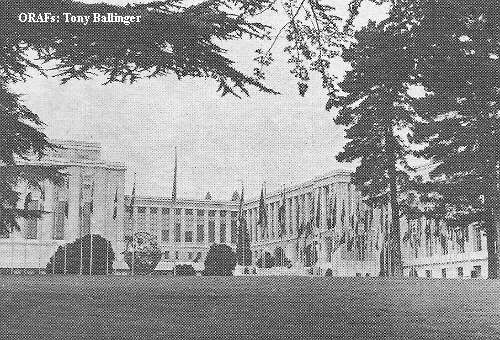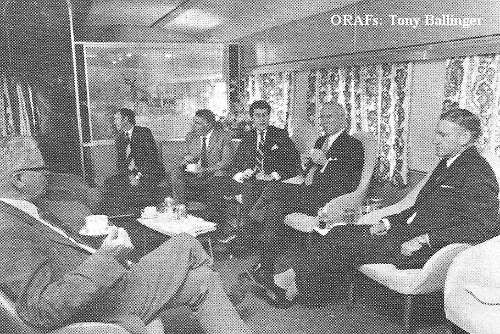Preservation of Land and Order 'First Priority'

Above: The Palais des Nations in Geneva, where yet more talks failed through African Nationalist intransigence.
A journalist's appraisal of the Rhodesian situation on the eve of the general election was published in the London "Times". It was written by Charles Douglas-Home, son of the former British Prime Minister and later Foreign Secretary, and was published in two parts. They were headed respectively "Preserving for Zimbabwe the most useful features of Rhodesia", and "If Mr. Smith is really prepared to hand over power who will be there to receive it?"
The following is a summarized version of Mr. Douglas-Homes' opinions and observations.
In the first article he contended that there were three main reasons why the Prime Minister, Mr. Ian Smith, was now coming under increasing pressure from whites to negotiate a transfer of power to a black majority "before it is too late".
Distinctive
He referred to the split in the Rhodesian Front, then continued: "There are many people in Rhodesia, both black and white, who believe he must now move fast if the best elements of Rhodesia are to be preserved after a change of power. If the change of power actually occurs — Angola-style — through an eventual civil war waged throughout Rhodesia, the new Zimbabwe will emerge without those elements of Rhodesia which will still make it such a distinctive country compared to most of the rest of Africa."
Douglas-Home contended that the first essential was therefore the preservation of law and order, and respect for it during a transitional period. "The role of the police and armed forces, both in a transitional period and under black government is naturally of fundamental importance.
Aggravated
"The question is aggravated by the reported desire of the Anglo American negotiating team to incorporate the guerrilla forces into the existing security forces of Rhodesia—almost along the lines recommended by Tanzania at the recent Commonwealth Conference, when the Foreign Minister suggested that the existing forces must be completely disbanded.
"This view is utterly rejected in Salisbury. Sources close to the armed forces also maintain that any outside attempt to deprive the police and army of its existing leadership —say down to unit level would lead to the disintegration of those forces, and consequently a collapse of security."
Inconceivable
He said it was inconceivable to anybody in Rhodesia that the new Zimbabwe could really be based on an army and police force founded from guerrillas. But the guerrillas would then have to be helped to train in other occupations since they could hardly be kept in being as a parallel force of arms to the official forces.
"The character of the Rhodesian military is traditionally apolitical and its leadership in private certainly subscribes to the principle that it would loyally serve any constitutionally evolved and elected administration — whatever its colour."
Essential
The second essential ingredient of a settlement which worried administrators and managers, not just the civil service, but throughout Rhodesian industry, was that the administrative and managerial structure of the country was not violently disrupted just when it would need to call on all the skills in its possession. Already attempts were being made to bring Africans into positions of management and in the civil service. Black directors were joining the board rooms and the considerable contribution to the economy made by African small businesses were being emphasized and cultivated.
The third essential sector which Rhodesians of all races wanted to preserve was the economy, which was one of the most energetic, vigorous and successful in Africa.
Food
"Who would guess that even now, while under attack from so many quarters, Rhodesia, through her grain and cattle exports, is feeding eight neighbouring countries who cannot fully feed themselves, though some of them appear to have the time and resources to support the guerrillas against their providers? Who would have guessed that after the first few bleak years of tobacco sanctions Rhodesia now has just auctioned off, in public, the second largest tobacco crop ever grown, with hardly any of the emergency restrictions on tobacco growth now in force? So much for sanctions there.
Sanctions
"Who would have guessed that the effect of sanctions on the tobacco sector forced many farmers to diversify to a point where now the size of Rhodesia's cotton crop has grown 50 times in 10 years, cattle production has expanded beyond all expectations, and the self-sufficiency acquired in the engineering sector has led to a whole range of machinery designed, made and exported from Rhodesia where no such capabilities had existed before and few such capabilities exist elsewhere, in black Africa."
Agriculture, said Douglas-Home, was still the heart of the economy and most of the other burgeoning industries benefited from the ripple effect of this expanded and enormously profitable sector. So it would not be just the pockets of white Rhodesians which would be affected by the collapse of the economy, it would be the financial future of large numbers of black businessmen and farmers and through them the wages of considerably more.
Power
In the second article, the author examined the difficulties related to the orderly transfer of power. "The gap which still has to be bridged is the gap between Mr. Smith's declared intention to hand over power to a duly elected black majority government and the practical way in which this transfer could take place. Yet since he is in the middle of an intensifying guerrilla war and is presiding over a country whose whole political and economic infrastructure is still white dominated, he cannot hand over his power to something which at the moment does not exist."
Authority
He concluded: "The whole thrust of American and British diplomacy at present appears to be in the direction of a black leadership in Zimbabwe which would have little legitimate authority behind it other than the barrel of the gun.
It would not be based on an electoral process so much as on the assumption — apparently already held in London and Washington — that Mr. Mugabe's Patriotic Front is anyway the likely winner of the contest and should therefore be helped to power without bothering too much about democratic niceties along the way.
Confusion
"At this moment of crisis in Rhodesian history it must be dismaying for Rhodesian emissaries to London to encounter such a degree of confusion and lack of will. It is small wonder that there lurks in Rhodesian minds — not just the Rhodesian Front — a basic mistrust of demands to hand over power to something which remains so im- precise, and which seems to bear all the hallmarks of unclear thinking in foreign offices and Cabinet rooms."
Below: The Rhodesian Government delegation aboard the train on the Victoria Falls bridge where constitutional talks were held. The talks collapsed.

End
Extracted and recompiled by Eddy Norris from the publication Focus on Rhodesia Vol. 2 No. 8.
Material made available by Tony Ballinger. Thanks Tony.
Publication not dated but is to believed to be from the mid to late 1970's.
Comments are welcome, please send them to Eddy Norris at orafs11@gmail.com


0 Comments:
Post a Comment
Subscribe to Post Comments [Atom]
<< Home